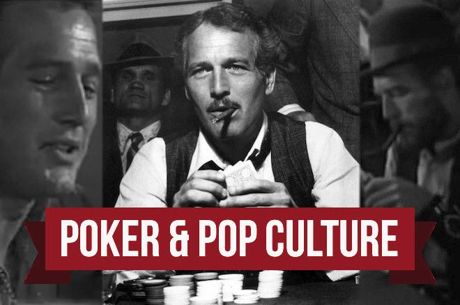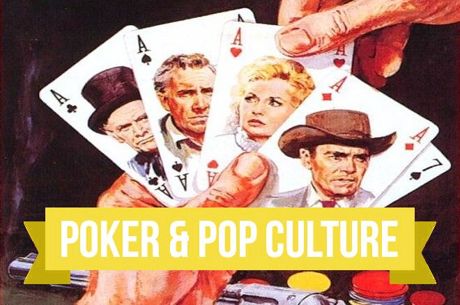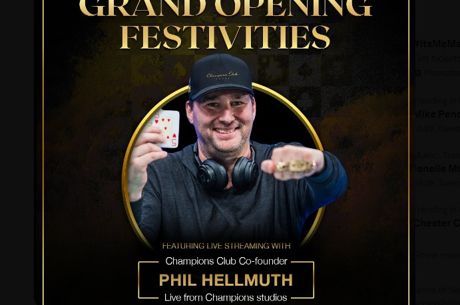Poker & Pop Culture: The Mystery of Texas Hold'em's History
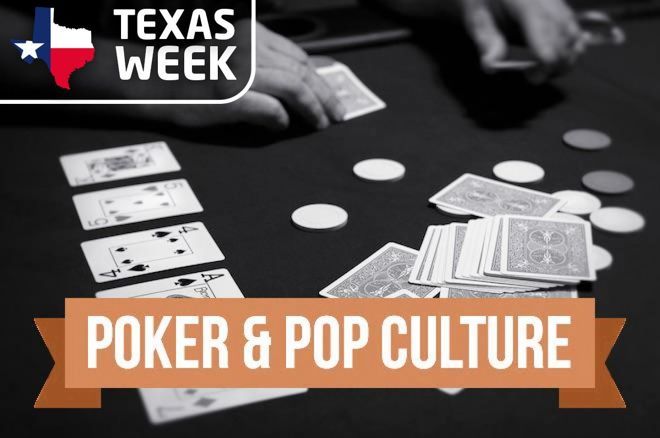
This article comes from the PokerNews archives and was originally published on April 04, 2017. It has been updated as a feature during PokerNews' Texas Week.
Generally speaking, just about all of the cultural expressions of poker considered thus far in this series have featured the game's earliest and most popular variants — draw and stud.
We've discussed poker games in 19th-century saloons, on steamboats and in frontier towns. We've considered stories of gunslingers, politicians and soldiers playing poker, including some famous fictions and literary treatments of the game as well as early strategy primers and applications of the game to business and military planning.
Other representations of poker in paintings, music, literature, film and "old time radio" carrying up through the mid-20th century (and a little further) have pushed the story closer to the present. And in most cases, the poker games described have continued to be either draw or stud.
That's because, of course, the variant most of us think of first when we think of poker — Texas Hold'em — had yet to arrive. But like the details of a poker hand being remembered differently by everyone involved, there exists significant conflict among accounts of just when and where hold'em emerged as an option among available variants.
Read highlights from the PokerNews Texas Road Trip here!
A few weeks back when "Catching Up with Cards at the Newsstand" we discussed an article appearing in the August 16, 1968 issue of LIFE magazine introducing to a mainstream audience "'Hold Me': a wild new poker game and how to tame it."
The game was "called Hold Me Darling, Tennessee Hold Me or Texas Hold 'Em" and "started somewhere in the South or Southwest a few years ago," went the introductory explanation. Amid a discussion of hold'em strategy, A.D. Livingston noted along the way how at the time not too many had heard of the game just yet.
In his 2008 book Holden on Hold'em, Anthony Holden describes that LIFE article as "Exhibit A for anyone investigating the origins of Hold'em."
There are other helpful exhibits for the person wishing to conduct such an inquiry. While we won't pretend to offer a definitive explanation of where the game started, we can share a few of the more interesting bits of evidence that shed light on the story of hold'em's beginnings. Or obscure it further, depending on your point of view.
Discover all you need to know about Texas Poker right here.
Imagined by a "creative cowboy"
After the earliest poker games involving no more than the dealing of five cards and a betting round the draw was introduced, adding a new layer of intrigue and a measure of skill to the game. Stud followed thereafter, a new way of playing poker that involved some of the cards being revealed prior to the showdown. (For more on the history and development of both variants, see "Following Draw, 'Stud-Horse Poker' Gallops In.")
Hold'em, many have speculated, represents yet another bit of poker evolution with Stud having been the immediate precursor. Rather than each player individually holding an assortment of "up" and "down" cards, all players received two cards face down while sharing five "community cards" dealt face up in the middle.
Over the decades many have surmised that hold'em resulted from a situation in which a group gathered for a game of stud but found there were too many players to be accommodated by a single deck. Indeed, with just two hole cards and five in the middle, hold'em theoretically could be played 23-handed (if dealt without burn cards), while in an eight-handed game of seven-card stud the deck can be exhausted prior to seventh street if enough players stick around.
James McManus reiterates a version of that thought in his 2009 history Cowboys Full, crediting a "creative cowboy" coming up with it amid a group of poker-playing ranch hands. But when, exactly, did hold'em's inventor have such an epiphany?
 Texas
Texas
- Live Poker is allowed
- Online Poker is forbidden
- Online Casino is forbidden
- Sports Betting is forbidden
Robstown, "the early 1900s"
"Hold'em has been played in Texas since the end of the nineteenth century," declares Al Alvarez in Poker: Bets, Bluffs and Bad Beats (2001) — a possibility, though not one echoed by too many others who have commented about the origins of hold'em.
Another declaration about the game was made a few years later, a formal one, in fact, made in the form of a resolution passed by the Texas state legislature in May 2007.
Beginning with an allusion to what was then a still-booming poker boom that no doubt inspired it ("WHEREAS, The popularity of the poker game Texas Hold'em has increased dramatically over recent years..."), the resolution includes a mini-history of hold'em among its several paragraphs.
"The game's invention dates back to the early 1900s when it is traditionally held that the first hand of the popular card game was dealt in the city of Robstown," confirms the Lone Star State's lawmakers.
While the "post hoc chest thumping" (as McManus calls the resolution) states with assured precision the location of hold'em's birthplace, it remains vague about the date of that imagined birth, tossing it back somewhere into the first half of the 20th century and inviting others to sort out the particulars.
"There's no evidence beyond this eyebrow-raising document that Texas Hold'em dates back to the early 1900s," Holden confirms, "and nothing but 'tradition' to suggest the first hand was dealt in... Robstown," a city Holden relevantly points out wasn't even founded until 1906.
Incidentally, Texas House member Abel Herrero was hold'em's hero, being the one to introduce the resolution. That Herrero is himself a native of Robstown, located in the state's 34th district which he represented (and does still today), was surely a coincidence.
Dallas, the mid-1920s or "around 1930"
When it comes to trying to locate just where in the "early 1900s" hold'em might have first appeared, Johnny Moss serves as a primary source to McManus, Holden and others thanks largely to the way the "Grand Old Man of Poker" answered questions posed to him about his early acquaintance with the game.
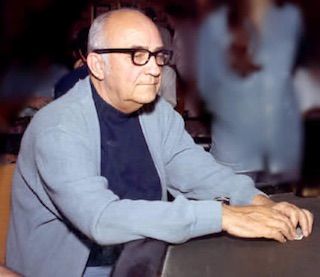
Talking to Don Jenkins for his 1981 biography Johnny Moss: Poker's Finest Champion of Champions, Moss described first encountering hold'em in two Dallas clubs, the Elks Club and the Otters Club, "around 1930." Moss mentions having played both fixed-limit and no-limit versions of the game.
A little earlier Moss had moved the date back a bit when talking to Jon Bradshaw for his great 1975 collection of sketches of famous gamblers titled Fast Company. Moss tells of initially working at a Dallas gambling house for $3 a day at the age of 16 (i.e., around 1923), then after "about three years" moving on to the "Elks Club 'cause there was some shrewd players in there who could learn me hold'em."
There are scant other references to hold'em being played as early as the 1920s, and in fact the game doesn't turn up at all in the story of Moss's most famous poker game, his later high-stakes heads-up match with Nick "the Greek" Dandalos at Binion's Horseshoe often pointed to as a kind of precursor of the World Series of Poker. (Of course, there's a lot of historical uncertainty surrounding that game, too.)
(For more on poker's colorful history in Dallas, see Sean Chaffin's feature "History and High Stakes in Big D.")
"Waco in the early 1940s"
A hilarious, poker-themed 1932 short story by the humorist James Thurber titled "Everything Is Wild" features both real and deliberately fictional poker variants — none of which are hold'em — and probably shouldn't be cited as a hard-and-fast source in this context. Even so, there an allusion to a hold'em-like game in the story that is worth bringing up in passing.
The story revolves around a dinner party involving three couples and a game of dealer's choice that follows it. One guest, the curmudgeonly Mr. Brush, is a poker purist, hating everything but straightforward five-card draw. Alas for him, the others keep calling games with wild cards, making him increasingly miserable as the night wears on.
One of the "wild" games called is "Poison Ivy," described as "a variation of poker in which each player gets four cards, and five others are placed face down on the table to be turned up one at a time," with the lowest card among the five in the center becoming a wild card. It isn't perfectly clear, but the cards in the middle do somewhat resemble "community cards" such as in hold'em.
Mr. Brush gets his revenge, by the way, by starting to call games he's invented out of whole cloth, giving them names like "Soap-in-Your-Eye" and "Splinter-Under-Your-Thumb." The rules (which he makes up as they go) are impossible to follow, and despite the fact that everyone seems to get royal flushes, no one much enjoys any of it but Mr. Brush.
A 1986 feature for the Houston Chronicle by Evan Moore with the title "Poker: The National Game of Texas" pushes the origin of hold'em a little further forward. "It is said to have started in Waco in the early 1940s," writes Moore, "and by 1946, it had spread through north Texas."
For his feature, Moore also spoke to Moss about his having played hold'em at the Elks Club, although that doesn't alter either the suggested start date for hold'em's timeline nor the different birthplace.
Waco or Corpus Christi, 1950s
Worth noting is a point McManus makes about how hold'em still wasn't being included poker-specific books like Oswald Jacoby's important Oswald Jacoby on Poker (first published in 1940, revised in 1948).
Jacoby does reference a game called "Cincinnati" that involves players being dealt five cards and there being five community cards from which to build a hand. A game called "Spit in the Ocean" is also mentioned, a draw variant that has players dealt four cards each then sharing a fifth card dealt face-up in the middle (the "spit"), the game Stanley Kowalski calls in A Streetcar Named Desire (1951).
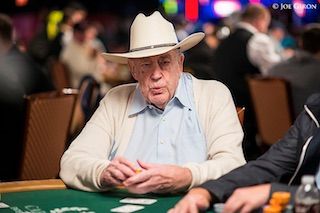
Doyle Brunson's 2009 memoir The Godfather of Poker offers more first-hand evidence as he details his early poker experience playing in underground games on Exchange Avenue in Fort Worth, "one of the toughest, meanest streets in America."
"Back in the early to mid-fifties, we played a lot of deuce-to-seven lowball, ace-to-five lowball, five-card stud, and five-card high draw — those were the main games," Brunson recalls.
"Hold'em wasn't played yet; at the time, no one had heard of the game."
"Round about 1958, I first learned about a game called hold'em," Brunson later explains, adding that most called it "hold me darling" at the time. "I suppose the game was spreading some because I started hearing of games" in other places, he recalls. "Some thought hold'em originated in Waco, although I've heard it said that hold'em might have begun in Corpus Christi.
Brunson acknowledges hold'em could have been played elsewhere and earlier, but his extensive experience "fading the white line" gives him deserved authority on the matter.
"I'm not really sure where the game began, but given that I'd never heard of hold'em before and I was playing games all over Texas and the South, I think the game must have started right about that time."
Learn more about poker in Texas here!
Castle Hills, early 1960s
"Exhibit B," says Holden, in the search for hold'em's origin story is Crandall Addington's entertaining essay for Brunson's Super System 2 (2005) describing "The History of No-Limit Texas Hold'em."
Truthfully, however, Addington's contribution isn't so focused on the actual origins of the game, but rather picks up the story around the time he first was introduced to hold'em in Castle Hills near San Antonio in 1963. Like many others, Addington credits fellow Poker Hall of Famer Felton "Corky" McCorquodale as chiefly responsible for hold'em's journey westward to Las Vegas around that time.
The situation remained unclear by the time LIFE magazine told the world about hold'em in 1968. "Exactly how widely Hold Me has spread is hard to determine," admitted Livingston. But within a couple of years the World Series of Poker would debut at Binion's, and not long after that no-limit hold'em was chosen as the game best suited for determining the WSOP champion.
"Hold'em... didn't overtake draw and seven-stud as the most popular game until the late 1980s," explains McManus, though even then the most frequently spread version of hold'em was the fixed-limit variety. Not until the twin catalysts of online poker starting in the late 1990s and hole-card camera enhanced televised poker in the early 2000s would no-limit hold'em become the most popular poker variant.
Conclusion
Whatever town or city or campfire was the site of hold'em first being played, the state of Texas rightly lays claim to the game. And despite Moss's recollections, the most persuasive commentators position hold'em's debut some time around mid-century or perhaps just after.
But like hold'em itself — with its two cards down and the rest in plain view — the challenge to locate its origin remains a partial information game.
From the forthcoming "Poker & Pop Culture: Telling the Story of America's Favorite Card Game." Martin Harris teaches a course in "Poker in American Film and Culture" in the American Studies program at UNC-Charlotte.
Photos: "Texas hold’em,” Todd Klassy, CC BY-SA 2.5; “Johnny Moss,” Delfort, CC BY-SA 3.0.
Free to Play Slots in the US
In this Series
- 1 PokerNews Texas Road Trip Day 6: Wrapping it Up in H-Town at Prime Social
- 2 Texas Card House Dallas Wins Appeal; Board of Adjustments Says Poker is Legal
- 3 Poker & Pop Culture: The Mystery of Texas Hold'em's History
- 4 How Texas College Vloggers Next Gen Poker Are Keeping Poker Entertaining
- 5 Bigger in Texas: A Look at the Lone Star State's All-Time Money List
- 6 Caffaro, Bond & Alvarado Among Early Winners in Texas Poker Championship
- 7 PokerNews Podcast: Texas Road Trip Highlights & Spotlight on Doyle Brunson
- 8 Why Baptist College President Helped "Sinner" Doyle Brunson Enter Athletics HOF





